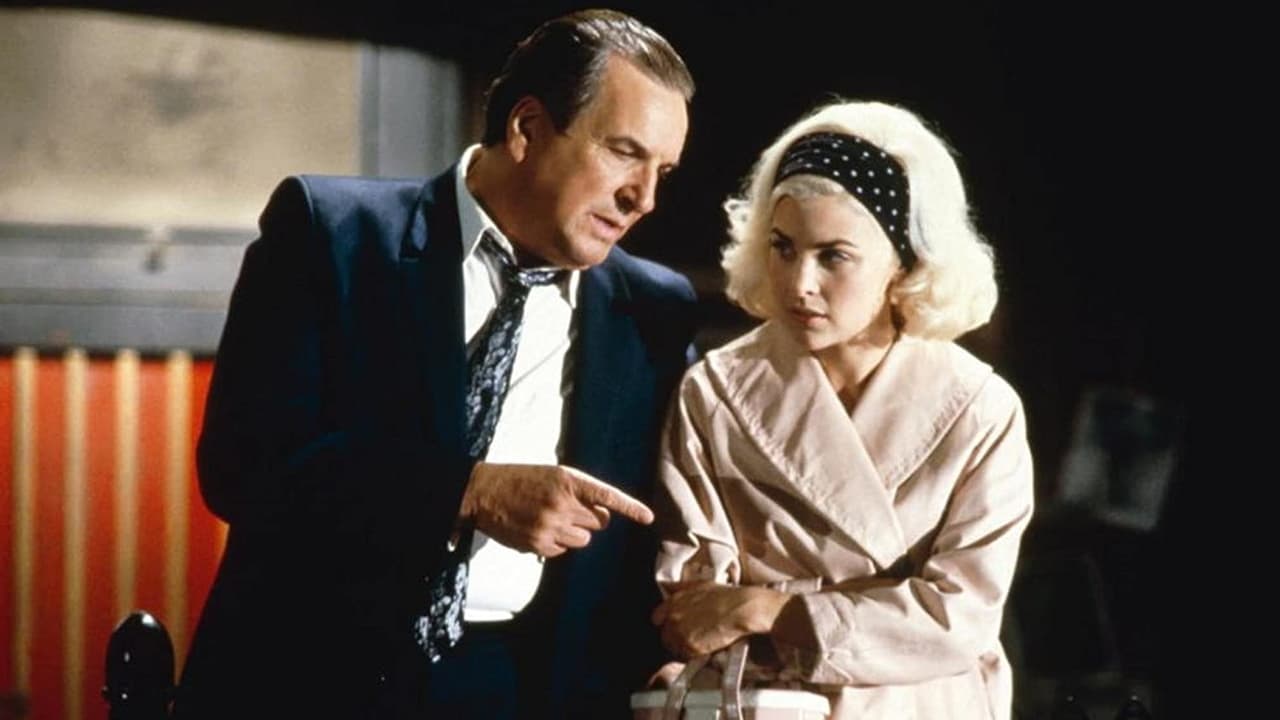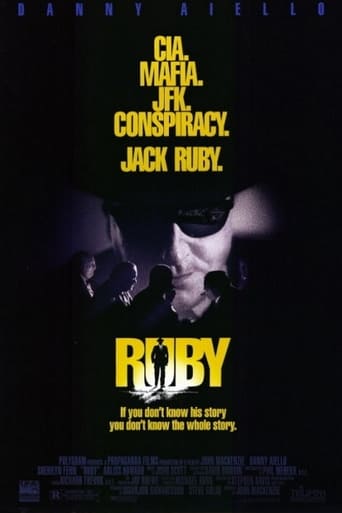

The JFK assassination might well be the biggest enigma in modern American history. Exactly what happened in Dealy Plaza on November 22, 1963 and why has been the subject of much speculation and interest. So it's no surprise then that filmmakers have taken a few cracks at exploring it, especially in the wake of Oliver Stone's 1991 film JFK. It was very shortly after JFK's release that John Mackenzie's Ruby hit cinema screens which was unfortunate as the film came to be overlooked. That wasn't a terrible thing though as watching the film reveals.I first saw Ruby around 2003 or so when the A&E channel here would run a film with commercials on TV around seven in the morning. Watching Ruby again on DVD now I realize how much was cut out of the film for that airing of it, around twenty minutes or so, and how that wasn't a bad thing. At ninety minutes or so the film moved along at a good pace but at its full running time it's far too long and complicated for its own good.Which is something that can be blamed on thing more than anything else: the script by Stephen Davis. Davis tries to use Ruby, himself something of an enigmatic figure, to tie together various strands of its own theory about the JFK assassination. The film takes the viewer from Dallas to Cuba, New Orleans, Las Vegas, and back to Dallas in the space of a little under two hours and often stretching believability to its limits along the way. A perfect example is an early sequence taking Ruby to Castro's Cuba which actually doesn't add much of anything to the overall film except add an additional character who does little and add more running time to the film. Other times it feels like Davis is just trying to show off his research such as adding Dallas police officer Tippit (played by a pre X-Files David Duchovny), allegedly killed by Oswald after the assassination, who is introduced early in the film and then never reappears. In the end, Davis' script tries to explain and condense so much that it becomes a muddled mess.That isn't the only problem with the script. The dialogue throughout is pretty atrocious, full of little more than clichés and exposition. That extends to the characters as well as virtually everyone in the film feels like a walking, talking cardboard cliché from Ruby (portrayed as a mobster with a heart of gold) to Candy Cane (the seemingly innocent girl who receives an education in how the world work) as well as various mobsters and government figures along the way. There's also some vast and quite obvious fictionalizations of people and events (such as Candy Cane who takes on elements of several different women to the point of being utterly unbelievable) that, along with the dialogue and characterizations, end up undermining the attempts at credibility that other elements of the film try so hard to obtain. It's a script that might be a passable for a TV movie but for a Hollywood feature film is sorely lacking.Why is a shame because there's good to be found in the film. The period recreations are quite good and do a solid job of invoking the early 1960s, especially in Las Vegas and Dallas from sets to costumes. If nothing else, the film is worth seeing for what looks to have been some expensive period recreations and for having actually shot scenes in Dallas as well. Overall, the film is stylishly made with not just wonderful production values but also some solid cinematography from Phil Méheux and direction from John Mackenzie. The only sour note production wise is the score from John Scott which never quite seems to mesh with the film outside of its use of source music, feeling like it was meant for another film entirely. On the whole though, on a purely production level, it's well made.Which brings us to the cast. The two leads, Danny Aiello and Sherilyn Fenn as Ruby and Candy Cane respectively, both turn in solid performances given the material they have to work from. Fenn in particular comes across quite well, turning in a solid performance while also looking stunning in period clothing. The supporting cast tries to do their best with sometimes awkward material that they end up often being wasted such as Marc Lawrence's mob boss and Arliss Howard as mysterious CIA agent Maxwell. It's a shame really because the cast could have done so much more one feels like.Indeed that sentiment sums up the entire film. Ruby tries to tell an interesting and compelling story, telling it with excellent period recreations and what should be a good cast. Instead it tells an overlong and muddled tale full of bad dialogue. Despite some of its finer points, Ruby ends up being a fairly forgettable film on an interesting subject that fails to say much of anything.
... View MoreJohn Mackenzie directed this speculative drama that stars Danny Aiello as Jack Ruby, the man who fatally shot Lee Harvey Oswald, and the events that led him there, where he was the owner of a Dallas strip club who hires popular headliner Candy Cane(played by Sherilyn Fenn) who ends up under the wing of the mafia, and becomes a mistress of President Kennedy. Ruby does favors for the mafia while simultaneously informing on them for the FBI, and eventually is used by a mysterious hit man for either the CIA or Mafia to kill Oswald, though he suspects he's as much a patsy as Oswald seems to be. David Duchovny co-stars as police officer Tibbet. Despite a good performance by Aiello, film is a pale knockoff of the far superior "JFK". Not bad, but entirely forgettable.
... View MoreWhatever his role may or may not have been in the Kennedy assassination, Jack Ruby was not a good or nice man. Trying to make anything positive out of him is imbecilic to start with and the premises for this picture don't improve any on that. Danny Aiello playing Ruby as a kind person is out of touch.There were in 1963 more than 200 million Americans so tell me what the odds are that three people who know each other closely and work together could all independently have some role in the assassination? Jack Ruby's bartender just happens to be the gunman who fires the fatal shot from the book depository window? Come on now.Anything of intelligence is hard to find in this story and there is as much evidence to support the theory that Rootie Kazootie was the gunman as there is evidence or believability for the first concept here.So far as film-making goes we can only grade C+. Never really makes you much take notice and when they get to what should be the climax they just rush through it with even less thought or effort.At worst this epistle is an insult to history. The liner notes on the inexpensive VHS I found state "forces us to reconsider the 'truth' of Kennedy's death." Well, horsepoop to that, but I will reconsider wasting time on any film by John MacKenzie. If the same mysterious shadowy people held a gun to his head and forced him to film a bad script, well then let him come forward before someone has to make another bad movie so we can find that out too.
... View MoreAn exploration of Ruby's motivation. Anyone who was not interested in this question would not bother to watch in the first place. I do not know if the film has "the right answer" but it is an answer which fits the facts.It is well acted and well photographed and "period". The incredible tameness of the striptease act in Ruby's club for example is presumably what it was like in those days, "swinging sixties" or no.As I say it would be tough to have a spoiler for this film because we already know the finale. It is tough to understand how he managed to shoot someone who one would have expected a half-way competent police department to keep a bit of an eye on, and the film has a go at explaining that.
... View More